主谓一致是指谓语动词在人称和数上必须与主语一致
- 格式:doc
- 大小:57.00 KB
- 文档页数:11

2022届高考英语二轮复习语法突破12【主谓一致】主谓一致是指谓语动词在人称和数上和主语一致,一般遵循三个原则,即: 语法一致原则、意义一致原则和就近一致原则。
考点一、语法一致原则主语的单复数决定了谓语动词的单复数。
1.动名词、动词不定式、从句、不定代词作主语时,谓语动词常用单数。
例:All the scientific evidence shows that increasing use of chemicals in farming is damaging our health.所有的科学证据都表明,在农业中使用越来越多的化学品正在危害着我们的健康。
What he said is far from the truth.他的话与事实相差太远了。
2.主语后接介词短语或其他插入语,如with, together with, as well as, like, but, except, along with, rather than, including, in addition to等,谓语动词的数要与前面的主语保持一致。
例:The leader and artist as well as some of our English teachers was given a chance to go abroad last year.那位领导兼艺术家和我们的一些英语老师一样去年得到了一次出国的机会。
I think Tom, rather than you is to blame for the accident.我认为是汤姆而不是你该为这起事故负责任。
3.and, both...and...连接两个不同的主语,谓语动词用复数形式;但是如果由and连接的两个名词表示同一概念,兼具身份或匹配出现时,谓语动词用单数形式。
例:Her teacher and her friends are in the sitting-room.她的老师和朋友们都在客厅。

主谓一致讲解及练习一、主谓一致的含义:主谓一致是指谓语动词与主语在人称和数上维持一致。
二、主谓一致三原则:主谓一致必需遵循三原则:语法一致原则,意义一致原则,就近一致原则。
(一)、语法一致原则:指主语是单数形式,谓语动词用单数形式,主语是复数形式,谓语也用复数形式。
1. 单数或不可数名词作主语,谓语动词用单数;复数名词作主语,谓语动词用复数。
如:The teache r i s here and the students ar e there .老师在这里,学生在那里。
2.each,every,neither,either,no+单数名词作主语或修饰主语时,谓语动词用单数。
如:Each room is full of people.每间屋子都挤满了人。
Each boy and girl____a new book.A.are given B.was given C.being given D.were given3.主语+with,together with,like,as well as,except, including等短语作定语时,谓语的单、复数与主语一致。
如:He as well as I wants to go boating. 他和我想去划船。
The teacher together with his students is going there on foot.老师和他的学生一路步行抵达那里。
Nobody but Jane____the secret.A.knows B.Know C.have know D.is know4.something,everything,anything,nothing,everybody,anybody,everyone,anyone,no one,nobody等复合不定代和单独的either,neither,each(each of),no one,the other,another等词作主语,谓语动词用单数。

前言在英语语法中,主谓一致是一个非常基础但又非常重要的知识点。
不管是在写作还是口语表达中,都需要正确使用主谓一致规则,以确保句子的表达清晰、准确。
下面将对英语主谓一致十大总结进行详细阐述。
一、基本规则主谓一致是指主语与谓语在人称和数上保持一致。
当主语是单数时,谓语动词要用单数形式;当主语是复数时,谓语动词要用复数形式。
二、特殊情况1. 连接词“and”连接的主语,谓语动词用复数形式。
2. 连接词“or”、“nor”连接的主语,谓语动词与最近的主语保持一致。
3. 当主语是“every”、“each”、“either”、“neither”等词时,谓语动词用单数形式。
4. 当主语是不可数名词时,谓语动词用单数形式。
三、独立主格当主语是“there”时,谓语动词要与后面的真正主语保持一致。
四、定语从句中的主谓一致定语从句中的主谓一致要与先行词保持一致。
五、数量词作主语当数量词作主语时,谓语动词取决于其后面的名词。
六、反身代词反身代词作主语时,谓语动词的形式要根据反身代词的人称和数来确定。
七、以复数形式结尾的词作主语以复数形式结尾的词作主语时,谓语动词使用复数形式。
八、主语是集体名词集体名词作主语时,谓语动词的形式取决于说话者对集体名词的看法。
九、there is/there are结构“there is/there are”结构中的谓语动词要与后面的主语保持一致。
十、句子的倒装在倒装句中,谓语动词要与主语保持一致。
结尾通过以上总结,我们可以清晰地了解了英语主谓一致的基本规则和特殊情况。
在日常的写作和交流中,只有熟练掌握这些规则,才能在表达时避免语法错误,使我们的表达更加准确和通顺。
希望大家在学习英语的过程中多加注意主谓一致的使用,提高自己的语言表达能力。

主语从句的主谓一致原则主语从句的主谓一致原则是指,当主语从句作主语时,其谓语动词的人称和数应与主语从句所表示的人或事物保持一致。
以下是主语从句主谓一致的原则:1. 主语从句表示单一的人或事物时,谓语动词用单数形式。
例如:Who is coming to the party is not important. 谁来参加派对并不重要。
2. 主语从句表示复数的人或事物时,谓语动词用复数形式。
例如:What we need are more books. 我们需要的是更多的书。
3. 当主语从句由“and”连接两个或两个以上的主语时,谓语动词通常用复数形式。
例如:Whether he or she is coming to the party is not important. 他或她是否来参加派对并不重要。
4. 当主语从句作主语时,如果后面跟有“together with”、“along with”、“as well as”、“like”等引导的短语时,谓语动词的人称和数应与主语从句保持一致。
例如:He, together with his friends, is going to the party. 他和他的朋友们一起去参加派对。
需要注意的是,当主语从句的主语是“the number of + 复数名词”时,谓语动词用单数形式;当主语从句的主语是“a number of + 复数名词”时,谓语动词用复数形式。
例如:The number of students in our school is 2000. 我们学校的学生人数是 2000 人。
A number of students in our school are from rural areas. 我们学校有许多学生来自农村地区。

初中英语语法——主谓一致一、主谓一致:主谓一致是指谓语动词与主语在人称和数上保持一致。
主谓一致必须遵循三原则:语法一致原则,意义一致原则,就近一致原则。
1. 语法一致原则:指主语是单数形式,谓语动词用单数形式,主语是复数形式,谓语也用复数形式。
例如:Tom is a good student. 汤姆是个好学生。
They often play football on the playground.他们经常在操场上踢足球。
2. 意义一致原则:指主语形式上为单数,但意义为复数,因此谓语动词用复数形式;或主语形式上为复数,但表示单数意义,这是谓语动词用单数形式。
例如: My family are having lunch now. 我们一家人现在正吃午饭。
Twenty dollars is too expensive for the book.这本书20 美元太贵了。
3. 就近一致原则:指谓语动词用单数形式还是用复数形式,取决于最靠近他的主语。
例如:Not only the teacher but also his students like playing football.不仅老师喜欢踢足球,而且他的学生也喜欢踢足球。
There is apenand some books on the desk.课桌上有一支钢笔和一些书。
二、主谓一致常考题型:1. 单数名词(代词),不可数名词做主语时,谓语用单数形式,复数名词(代词)做主语,谓语用复数形式。
2. many a+单数名词做主语,意义虽为“许多”,但谓语要用单数形式。
例如: Many a student has been to Shanghai. 许多学生到过上海。
3. more thanone+单数名词做主语,谓语用单数。
例如: More than one student has ever been to Beijing.不止一个学生曾经去过北京。
4. 表示时间,价格,重量,数目,长度,数学运算等的词或短语做主语时,这些通常作一个整体概念,谓语用单数形式。

主谓一致的用法及专项练习题一、主谓一致三原则主谓一致是指谓语动词与主语在人称和数上保持一致,主谓一致必须遵循三原则:语法一致原则,意义一致原则,就近一致原则。
1.语法一致原则:指主语是单数形式,谓语动词用单数形式,主语是复数形式,谓语也用复数形式。
Tom is a good student. 汤姆是个好学生。
They often play football on the playground. 他们经常在操场上踢足球。
2.意义一致:指主语形式上为单数,但意义为复数,因此谓语动词用复数形式;或主语形式上为复数,但表示单数意义,这是谓语动词用单数形式。
My family are having lunch now. 我们一家人现在正吃午饭。
Twenty dollars is too expensive for the book. 这本书20美元太贵了。
3.就近一致:指谓语动词用单数形式还是用复数形式,取决于最靠近他的主语。
例如:Not only the teacher but also his students like playing football.不仅老师喜欢踢足球,而且他的学生也喜欢踢足球。
There is a pen and some books on the desk.课桌上有一支钢笔和一些书。
二、主谓一致常考题型1. 单数名词(代词),不可数名词作主语时,谓语用单数形式,复数名词(代词)作主语,谓语用复数形式。
The desk is Tom’s. 这张桌子是汤姆的。
Some water is in the bottle. 一些水在瓶子里。
The students are playing football on the playground. 这些学生正在操场上踢足球。
2. many a+单数名词作主语,意义虽为“许多”,但谓语要用单数形式。
Many a student has been to Shanghai. 许多学生到过上海。
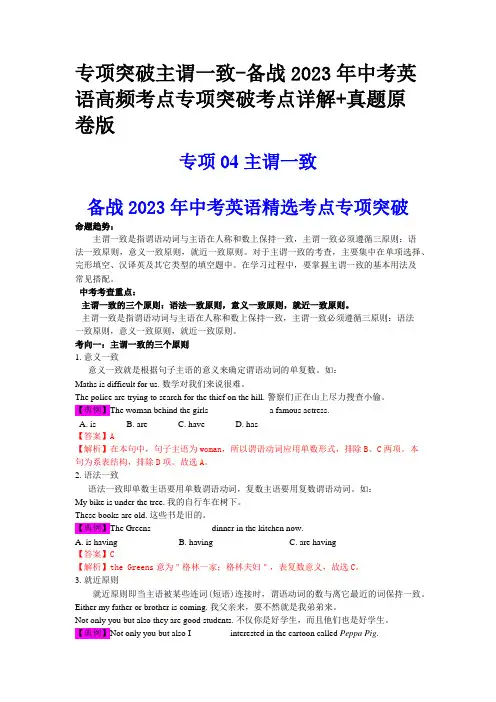
专项突破主谓一致-备战2023年中考英语高频考点专项突破考点详解+真题原卷版专项04 主谓一致备战2023年中考英语精选考点专项突破命题趋势:主谓一致是指谓语动词与主语在人称和数上保持一致,主谓一致必须遵循三原则:语法一致原则,意义一致原则,就近一致原则。
对于主谓一致的考查,主要集中在单项选择、完形填空、汉译英及其它类型的填空题中。
在学习过程中,要掌握主谓一致的基本用法及常见搭配。
中考考查重点:主谓一致的三个原则:语法一致原则,意义一致原则,就近一致原则。
主谓一致是指谓语动词与主语在人称和数上保持一致,主谓一致必须遵循三原则:语法一致原则,意义一致原则,就近一致原则。
考向一:主谓一致的三个原则1. 意义一致意义一致就是根据句子主语的意义来确定谓语动词的单复数。
如:Maths is difficult for us. 数学对我们来说很难。
The police are trying to search for the thief on the hill. 警察们正在山上尽力搜查小偷。
【典例】The woman behind the girls _____________ a famous actress.A. isB. areC. haveD. has【答案】A【解析】在本句中,句子主语为woman,所以谓语动词应用单数形式,排除B、C两项。
本句为系表结构,排除D项。
故选A。
2. 语法一致语法一致即单数主语要用单数谓语动词,复数主语要用复数谓语动词。
如:My bike is under the tree. 我的自行车在树下。
These books are old. 这些书是旧的。
【典例】The Greens _____________ dinner in the kitchen now.A. is havingB. havingC. are having【答案】C【解析】the Greens意为"格林一家;格林夫妇",表复数意义,故选C。
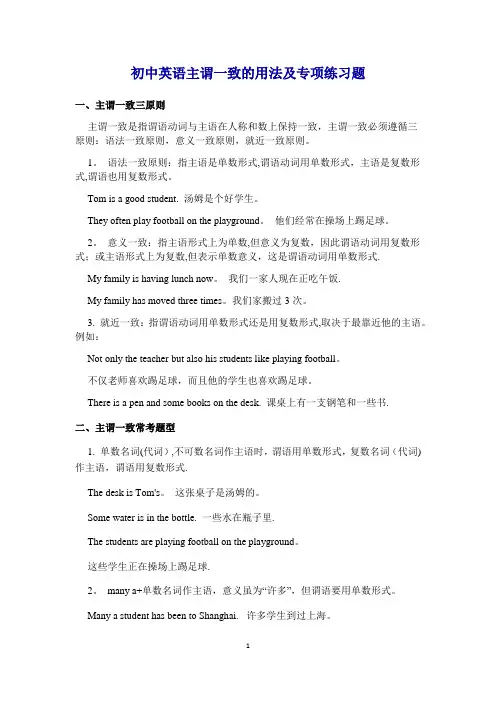
初中英语主谓一致的用法及专项练习题一、主谓一致三原则主谓一致是指谓语动词与主语在人称和数上保持一致,主谓一致必须遵循三原则:语法一致原则,意义一致原则,就近一致原则。
1。
语法一致原则:指主语是单数形式,谓语动词用单数形式,主语是复数形式,谓语也用复数形式。
Tom is a good student. 汤姆是个好学生。
They often play football on the playground。
他们经常在操场上踢足球。
2。
意义一致:指主语形式上为单数,但意义为复数,因此谓语动词用复数形式;或主语形式上为复数,但表示单数意义,这是谓语动词用单数形式.My family is having lunch now。
我们一家人现在正吃午饭.My family has moved three times。
我们家搬过3次。
3. 就近一致:指谓语动词用单数形式还是用复数形式,取决于最靠近他的主语。
例如:Not only the teacher but also his students like playing football。
不仅老师喜欢踢足球,而且他的学生也喜欢踢足球。
There is a pen and some books on the desk. 课桌上有一支钢笔和一些书.二、主谓一致常考题型1. 单数名词(代词),不可数名词作主语时,谓语用单数形式,复数名词(代词)作主语,谓语用复数形式.The desk is Tom's。
这张桌子是汤姆的。
Some water is in the bottle. 一些水在瓶子里.The students are playing football on the playground。
这些学生正在操场上踢足球.2。
many a+单数名词作主语,意义虽为“许多”,但谓语要用单数形式。
Many a student has been to Shanghai. 许多学生到过上海。
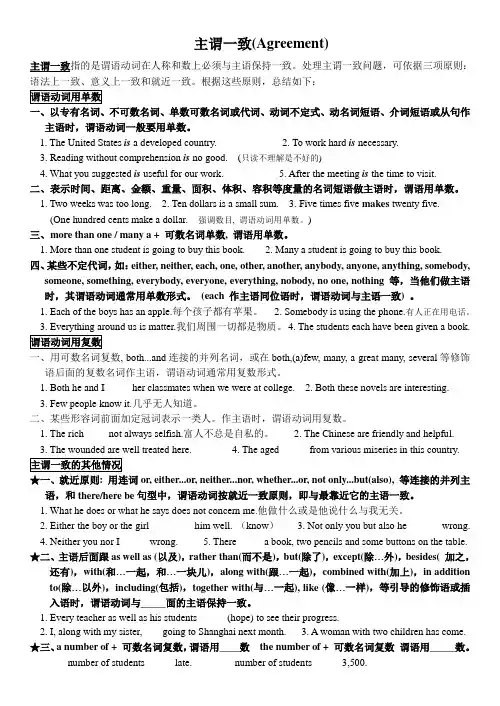
主谓一致(Agreement)主谓一致指的是谓语动词在人称和数上必须与主语保持一致。
处理主谓一致问题,可依据三项原则:语法上一致、意义上一致和就近一致。
根据这些原则,总结如下:一、以专有名词、不可数名词、单数可数名词或代词、动词不定式、动名词短语、介词短语或从句作主语时,谓语动词一般要用单数。
1. The United States is a developed country.2. To work hard is necessary.3. Reading without comprehension is no good. (只读不理解是不好的)4. What you suggested is useful for our work.5. After the meeting is the time to visit.二、表示时间、距离、金额、重量、面积、体积、容积等度量的名词短语做主语时,谓语用单数。
1. Two weeks was too long.2. Ten dollars is a small sum.3. Five times five makes twenty five.(One hundred cents make a dollar. 强调数目, 谓语动词用单数。
)三、more than one / many a + 可数名词单数, 谓语用单数。
1. More than one student is going to buy this book.2. Many a student is going to buy this book.四、某些不定代词,如:either, neither, each, one, other, another, anybody, anyone, anything, somebody,someone, something, everybody, everyone, everything, nobody, no one, nothing 等,当他们做主语时,其谓语动词通常用单数形式。
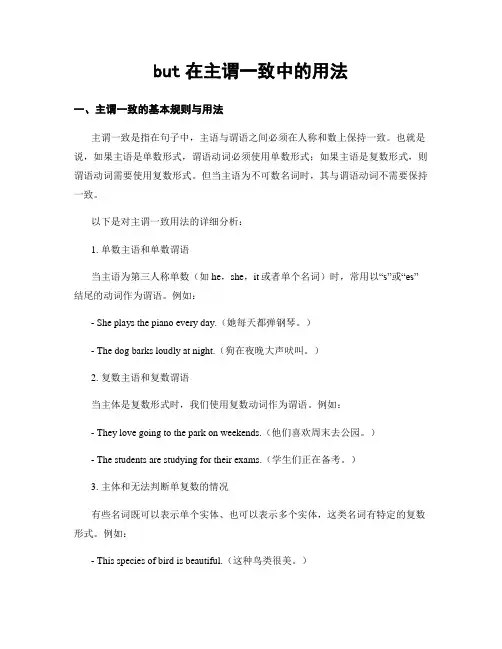
but在主谓一致中的用法一、主谓一致的基本规则与用法主谓一致是指在句子中,主语与谓语之间必须在人称和数上保持一致。
也就是说,如果主语是单数形式,谓语动词必须使用单数形式;如果主语是复数形式,则谓语动词需要使用复数形式。
但当主语为不可数名词时,其与谓语动词不需要保持一致。
以下是对主谓一致用法的详细分析:1. 单数主语和单数谓语当主语为第三人称单数(如he,she,it或者单个名词)时,常用以“s”或“es”结尾的动词作为谓语。
例如:- She plays the piano every day.(她每天都弹钢琴。
)- The dog barks loudly at night.(狗在夜晚大声吠叫。
)2. 复数主语和复数谓语当主体是复数形式时,我们使用复数动词作为谓语。
例如:- They love going to the park on weekends.(他们喜欢周末去公园。
)- The students are studying for their exams.(学生们正在备考。
)3. 主体和无法判断单复数的情况有些名词既可以表示单个实体、也可以表示多个实体,这类名词有特定的复数形式。
例如:- This species of bird is beautiful.(这种鸟类很美。
)- Fish swim in the ocean.(鱼儿在大海中游动。
)4. 不可数名词和单复数谓语不可数名词通常用于泛指,它们不能将谓语动词与其数量一起使用。
例如:- Water is essential for life.(水对生命至关重要。
)- The information she provided was helpful.(她提供的信息很有帮助。
)二、主谓一致的进阶用法除了基本规则外,主谓一致的用法还有一些进阶技巧需要注意。
1. 同位语干扰当句子中存在同位语时,容易导致主谓不一致的错误发生。
同位语是对前面名词进行解释或者补充说明的成分,并不应该影响主谓一致原则。
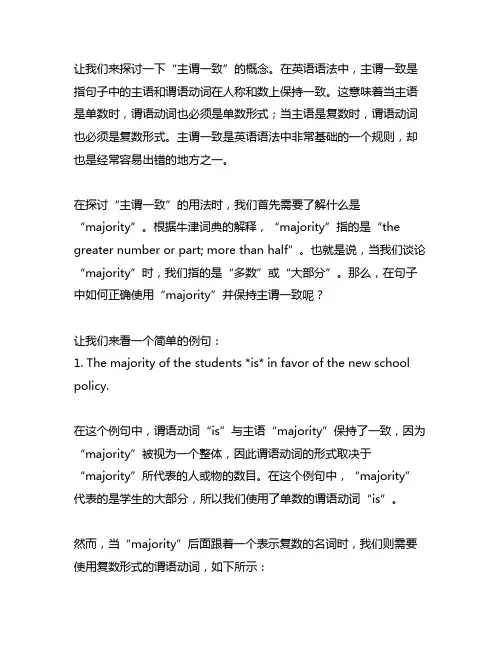
让我们来探讨一下“主谓一致”的概念。
在英语语法中,主谓一致是指句子中的主语和谓语动词在人称和数上保持一致。
这意味着当主语是单数时,谓语动词也必须是单数形式;当主语是复数时,谓语动词也必须是复数形式。
主谓一致是英语语法中非常基础的一个规则,却也是经常容易出错的地方之一。
在探讨“主谓一致”的用法时,我们首先需要了解什么是“majority”。
根据牛津词典的解释,“majority”指的是“the greater number or part; more than half”。
也就是说,当我们谈论“majority”时,我们指的是“多数”或“大部分”。
那么,在句子中如何正确使用“majority”并保持主谓一致呢?让我们来看一个简单的例句:1. The majority of the students *is* in favor of the new school policy.在这个例句中,谓语动词“is”与主语“majority”保持了一致,因为“majority”被视为一个整体,因此谓语动词的形式取决于“majority”所代表的人或物的数目。
在这个例句中,“majority”代表的是学生的大部分,所以我们使用了单数的谓语动词“is”。
然而,当“majority”后面跟着一个表示复数的名词时,我们则需要使用复数形式的谓语动词,如下所示:2. The majority of the students *are* in favor of the new school policy.在这个例句中,我们使用了复数形式的谓语动词“are”,因为“students”是一个复数名词,而“majority of the students”意指学生中的多数。
除了名词后面可以跟着动词的单数或复数形式外,当我们在谈论“majority”时,还可以把它作为主语来使用,如下所示:3. The majority *agrees* on the new proposal.在这个例句中,我们使用了单数形式的动词“agrees”,因为“majority”在这里被当作一个整体来看待,代表着一致的意见。
主谓一致就近原则
主谓一致是指句子中的主语和谓语在人称和数方面要保持一致。
就近
原则是指当主语由多个名词或代词构成时,谓语动词的形式与离其最近的
名词或代词保持一致。
主谓一致使得句子更加流畅和易于理解,同时也能避免产生语法错误。
就近原则则是在主语由多个名词或代词组成时,选择离谓语动词最近的名
词或代词来决定谓语动词的形式。
下面是一些主谓一致和就近原则的例子:1.单个主语的情况:
- The cat is sleeping.(猫在睡觉)
- He is playing basketball.(他在打篮球)
2.多个主语的情况:
- The cat and the dog are playing.(猫和狗在玩耍)
- She and her brother are studying.(她和她哥在学习)
3.就近原则的应用:
- Neither the students nor the teacher is happy.(学生和老师
都不开心)
- Either the cat or the dogs are responsible for the mess.
(是猫还是狗造成了这一困境)
总结起来,主谓一致和就近原则对于正确使用英语语法至关重要。
在
撰写文章或交流时,我们应该注意主语和谓语之间的一致性,并根据就近
原则选择正确的动词形式。
这样能够使我们的语言更加准确和流利。
主谓一致三原则作者:刘平来源:《新高考·高一英语》2012年第05期主谓一致是高中阶段英语语法学习的重点之一。
学生在平时的学习过程中,尤其是在写作时,会忽视主谓一致的原则。
为更好地掌握主谓一致的使用原则,现将主要知识要点归纳如下:主谓一致是指句子的主语和谓语动词在人称和数上要保持一致,通常遵循以下三个原则:1. 语法一致原则,即主语是单数,谓语也要用单数形式;主语是复数,谓语也用复数形式。
2. 意义一致原则,即主语形式为单数,但意义是复数,谓语动词用复数;主语形式为复数,但意义为单数,谓语动词用单数。
3. 就近原则,即谓语动词的单复数形式由最靠近它的主语来决定。
一、语法一致原则1. 动词不定式、动名词或从句作主语时,谓语动词一般用单数。
what引导的主语从句,如果表语是复数,则谓语动词用复数形式。
例如:Seeing is believing. 眼见为实What he said is right. 他说的是对的。
What we need are more books. 我们需要的是更多的书。
2. 在定语从句中,关系代词that, which, who等作主语时,谓语动词的数应与句中先行词的数保持一致。
例如:I, who am your close friend, will help you. 我是你的好朋友,我会帮你的。
Those who want to go to the cinema puts up your hands. 想去电影院的人请举手。
Anyone who wants to go to the cinema puts up your hands. 谁想去电影院谁举手。
one of +复数名词+who/that/which”结构中,关系代词who/that/which的先行词是靠近它的复数名词,所以从句中谓语动词用复数形式。
但当one之前有the或the only 修饰时,关系代词的先行词是the one或the only one,因此从句中的谓语动词要用单数形式。
第十六章主谓一致主谓一致(concord),是指主语和谓语动词要保持人称和数上的一致。
英语中动词be的变化形式最多,如I am,You are,He is,We are等。
主语I一定要用am 的动词形式,这就叫“主谓一致”。
一、主谓一致的三个原则主谓一致涉及三个基本原则,即语法一致原则(principle of grammatical concord)、意义一致原则(principle of notional concord)和就近原则(principle of proximity)。
A.语法一致语法一致是指主语和谓语在单复数形式上的一致关系,主语为单数形式,谓语动词用单数形式;反之,谓语动词用复数形式。
My child has no intention of spending a vacation with me. 我的孩子不想与我一起度假。
My children have no intention of spending a vacation with me. 我的孩子们不想与我一起度假。
B.意义一致意义一致是说谓语动词的单、复数要取决于主语所表达的概念,而不取决于表面上的语法标记。
1. 主语形式虽为单数,但意义为复数,谓语动词用复数。
The only people who are interested in the book seem to be lawyers. 唯一对这本书感兴趣的人好像是律师。
The majority of primary school teachers are women. 大多数小学老师都是女的。
2. 主语形式为复数,而意义上却是单数,谓语动词用单数。
No news is good news. 没有消息就是好消息。
Billiards is becoming more and more popular in some cities. 桌球在一些城市里越来越受欢迎。
C.就近原则就近原则是指当主语由两个或两个以上名词或代词组成时,谓语动词的数要与它紧邻的名词或代词的数一致。
高考英语复习专题10 主谓一致知识点归纳总结主谓一致(concord),是指主语和谓语动词要保持人称和数上的一致。
英语中动词be的变化形式最多,如I am,You are,He is,We are等。
主语I一定要用am的动词形式,这就叫“主谓一致”。
一、主谓一致的三个原则主谓一致涉及三个基本原则,即语法一致原则(principle of grammatical concord)、意义一致原则(principle of notional concord)和就近原则(principle of proximity)。
A. 语法一致语法一致是指主语和谓语在单复数形式上的一致关系,主语为单数形式,谓语动词用单数形式;反之,谓语动词用复数形式。
My child has no intention of spending a vacation with me. 我的孩子不想与我一起度假。
My children have no intention of spending a vacation with me. 我的孩子们不想与我一起度假。
B. 意义一致意义一致是说谓语动词的单、复数要取决于主语所表达的概念,而不取决于表面上的语法标记。
1. 主语形式虽为单数,但意义为复数,谓语动词用复数。
The only people who are interested in the book seem to be lawyers. 唯一对这本书感兴趣的人好像是律师。
The majority of primary school teachers are women. 大多数小学老师都是女的。
2. 主语形式为复数,而意义上却是单数,谓语动词用单数。
No news is good news. 没有消息就是好消息。
Billiards is becoming more and more popular in some cities. 桌球在一些城市里越来越受欢迎。
高中英语语法系统讲解之十二主谓一致主谓一致指的是句子的主语和谓语动词在人称和数上应保持一致,通常指的主谓一致是主语和谓语在单数和复数上的一致性。
一. 主谓一致的三个原则1. 语法一致原则主语单复数决定谓语动词的单复数形式,即主语是单数,谓语用单数;主语是复数,谓语用复数。
如The number of errors is surprising.Two students are waiting for you in your office.2. 意义一致原则主语形式虽为单数,但意义为复数,谓语动词用复数;主语形式为复数,但意义上为单数,谓语动词用单数。
如The crowd were running for their lives.The news was very surprising.形复意单的单词有news,works(工厂),means和以ics结尾的学科名词politics,physics,economics 等。
3. 就近原则谓语动词的单复数取决于最靠近它的词语,主要体现在由or,either … or,neither… nor …,not only … but also等连接的主语及there be …句型中。
如Nither you nor I am wrong.There is a pen, five pencils and two pencilboxes on the table.二、谓语动词用单数形式的情况1、单个的不可数名词、单数名词(尽管后面跟着with,together with,along with,like,including,as wellas,in addition to,rather than,but,except,more than等连接的短语)作主语时,谓语动词用单数式。
如:The news is going about quickly in the small town.A woman with two children has come.Helen as well as I is eager to see the performance.You rather than I are going to go camping.2、one,no one,nobody,anyone,anybody,someone,somebody,one of,every,everyone,everybody,each,either,neither等用作主语或修饰主语时,谓语动词用单数形式。
主谓一致是指谓语动词在人称和数上必须与主语一致。
下面让我们看看不同类型的主谓一致。
1. 名词做主语(1)单复数主谓一致A) 一般词汇:有些词汇的复数形式是固定不变的,如:crossroads (十字路口;聚焦点), headquarters (总部), means (方法,手段), species (种类,品种), ser ie s (系列)等,但其动词的单复数取决于两点:a) 取决于限定词:例:Every means has been tr ie d but without much result.(各种方法都试过,可没有多大效果。
)b) 取决于上下文内容、作者所要表达的意思、特指还是泛指:例:Are/ Is there any other means of solving the problem?(还有什么其它解题的方法吗?注意:这里可以用are表示其它方法,也可以用is表示和现在所用的方法相对比的另一种方法。
)My favorite book is The Old Man and the Sea.(我喜爱的书是《老人与海》。
注意:本句是特指。
)Our TV ser ie s are much better than those of Japan.(我国的电视剧比日本的好得多。
注意:本句是泛指。
)c) 从句做主语How to develop a healthy habit is a good question to discuss.d) 学科名词一般用单数谓语动词。
这样的词有:economics(经济学), electronics(电子学), mathematics(数学), politics(政治学)等等。
例:Politics is a good topic for discussion.(政治是谈论的好题目。
)e)有些表示成双成对的词,常常只用复数形式,动词一律用复数,也不能用不定冠词。
比如要表示“一……”,要使用量词,通常使用“a pair of”。
这样的词有:eyeglasses(眼镜), pants(裤子), scissors(剪刀), shoes(鞋), shorts(短裤), socks(短袜), stockings(长统袜), tr ousers(裤子)等。
B) 无复数形式的名词a) 有些名词,特别是一些表示动物的名词,其单复数形式是固定不变的,但其动词的单复数取决于其限定词和上下文内容。
例:That Japanese has been to China for twenty times.(这位日本人已来过中国20次了。
)Those Japanese are visitors to our university.(那些日本人是到我们大学来参观的客人。
)b) 集合名词:大部分集合名词都可使用单数或复数动词,这主要取决于作者的强调点:强调整体时,用单数谓语;强调这个集体里的成员时,用复数谓语。
这样的集合名词有:army(军队), aud ie nce(观众、听众), crowd(人群), firm(公司), government(政府), group(组、群), public(公众), staff(全体工作人员), union(联盟)等。
例:The aud ie nce was excited by the excel lent show.(精彩的演出使全体观众情绪激昂。
)The public is/are requested not to leave litter in the public places.(公众不能在公共场所乱扔垃圾。
)注意:还有一些集合名词也没有复数形式,但只能做复数名词使用,谓语动词应该用复数。
这样的man(人类), police(警察)等。
c) 专有名词和不可数名词的谓语一律用单数谓语。
前者指人名、地名、国家名、城市名、书名、机构名或重大事件。
后者又可分为物质和抽象名词两大类。
例:The United Nations is trying to find a better way to bring the two part ie s together.(联合国正在寻求更有效的方法来调停双方。
)C) 另外,还有特殊复数形式的名词也需要你的特殊注意。
这些词的复数形式可能并不明显,所以常导致谓语单复数错误。
特殊复数形式的名词:phenomenon - phenomena(现象), goose - geese(鹅), mouse - mice(老鼠)等(2) 不定代词和带限定词的名词做主语A) 不定代词或every加名词做主语:every, each, either, neither, one, no one, somebody, anybody, nobody, everyone, someo ne, anyone, everyone, something, anything, nothing, everything在句中做主语,或做限定词限定一个名词时,后面的谓语一律用单数。
注意:上述词语做限定词加of时,后面的名词或代词都应该用复数,但谓语却用单数。
即使有定语从句,其主句、从句谓语仍用单数。
例:Each one of us who is now living remembers the event.B) 限定词加名词做主语:all, any, many, more, most, some的谓语动词的单复数取决于它们所修饰的名词。
a) all, any, many, more, most, some修饰单数名词时,谓语为单数;当修饰复数名词时谓语为复数。
例:All of the world is against wars.(全世界都反对战争。
)There is some girl at the telephone who wants to speak to you.(有个女孩打电话来,找你。
)b) all, any, many, more, most, some加复数名词时,谓语用复数动词。
例:All roads lead to Rome.(条条大路通罗马。
)c) all, any, many, more, most, some修饰不可数名词时,谓语用单数动词。
例:If there is any trouble, please come to me.(如果有什么困难,请来找我。
)More e XP er ie nce is important for getting a good job.(要得到好工作,重要的是要有更多的经验。
)2. 含有of的短语和介宾短语做主语(1)half of, all of, any of, a lot of, most of, … percent of, some of, five sevenths of等短语的动词单复数取决于of后面所跟的名词或代词,即:单数名词或代词要求用单数动词;复数名词或代词用复数动词,不可数名词或代词用单数动词。
例:Half of my spare time is spent on my hobby.(我一半的业余时间都花在我的爱好上了。
)(2)a number of后面要求加复数名词或代词,其动词用复数形式;但the number of后面加复数名词或代词时,其谓语用单数。
因为前者的意思是“大量、许多、若干”,等于numbers of;后者的意思是“总数、合计”,强调的是一个数字,所以应该看成单数主语。
(3)the rest(of)表示“剩余、其余”,其用法也有二:a) of后面可接单数、复数及不可数名词,相应的谓语动词的单复数取决于of后面所跟的名词。
b) 如果the rest表示的是剩下的东西,则谓语动词用单数;如果表示的是其余的,特别指人时,其谓语动词应该用复数。
例:The majority of students went to the lab, the rest are staying in the classroom.(多数学生去了实验室,其余的人留在教室。
)(4) 当主语不止一个,且主语间由介词with, together with, along with, as well as, as much as, no less than, more than, not to mention, including, like, but, except等连接时,其谓语动词取决于前一个主语,即上述介词前的名词或代词。
例:Television, along with other means of communication, helps us to keep informed about contemporary affairs.3. 连词加名词做主语(1)not only……but also, either……or, neither……nor, or等连接多个主语时,谓语动词的单复数取决于离谓语最近的那个主语。
这就是我们常说的“就近原则”。
例:Not only one but also all of us were invited.(不只是一个,而是我们全体都受到邀请。
)(2)由and连接两个或多个主语时,后面一般都跟复数谓语动词,只有在下述几种情况下,才要求接单数谓语:A) 表示“兼”时:例:The singer and dancer attends our evening.(这位歌手兼舞蹈家参加了我们的晚会。
)注意:表示两个人时,and后面应加不定冠词、定冠词或其它限定词。
B) 固定词组a knife and fork(一副刀叉), a cup and saucer(带茶托的茶杯), ice-cream and cake(冰淇淋蛋糕), iron and steel (钢铁)等,动词一律用单数。
注意:如果把and前面和后面的词作为两个不同的内涵(通常在and后面的名词或代词前加不定冠词、定冠词或其它限定词),则说明and起并联作用,谓语应该用复数。
例:There are a knife and a fork.(桌子上有一把刀子和一把叉子。
)4. 数词、量词和动名词等做主语(1)量词做主语:凡是计量时间、距离、金钱、体积、尺寸等的度量衡做主语时,谓语动词都用单数。
常见的这种词有:years, dolla rs, dozens, miles, length, width等。
例:100 years is too long.(100年太长。
)(2)数学上的加、减、乘、除的规律是:加法和乘法的谓语动词单复数皆可;而减法和除法的谓语动词一律用单数。